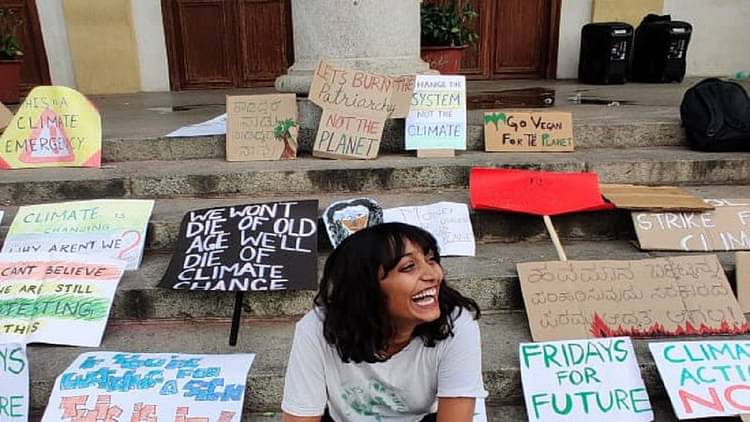Delhi Police Commissioner S N Shrivastava on Tuesday said the arrest of climate activist Disha Ravi was made in “accordance with law”. Talking to reporters at an event, Shrivastava said it is wrong when people say that there were lapses in the arrest of the 22-year-old activist.
Ravi was arrested from Bengaluru on Saturday in connection with a protest ‘toolkit’ backing the farmers' agitation. Delhi Police have claimed that she had sent the ‘toolkit’ to teen climate activist Greta Thunberg through the Telegram app, and also "coaxed her to act on it".However, legal experts have pointed out several lapses in the way the case has been handled.
Given that Ravi was arrested in Bengaluru and not Delhi, one of the first questions raised about her arrest was that the Delhi Police had failed to obtain a transit remand order from a local court there to take her out of Karnataka and bring her to Delhi.
Talking to National Herald, Sanjay Hegde, Senior Advocate, Supreme Court of India, said that the concept of transit remand comes under Article 22(2) of the Constitution, as per which an accused has to be produced before the “nearest magistrate” within 24 hours.“The magistrate at Patiala House Court was most certainly not the nearest magistrate to Ravi’s Bengaluru residence, where the arrest took place,” Hedge said.“The issue of transit remand allows an accused to make submissions in a court of law. It also enables an accused to seek transit bail,” Hegde pointed out.
Applicability of sedition case
According to a press release issued by Delhi Police on February 15, a team from the Special Cell was sent to Bengaluru to question Disha, which was “able to extract highly incriminating information” from her phone.This information, it alleged, “made it clear that Disha, along with her colleagues, Shantanu and Nikita Jacob, created and sent the Toolkit Google document to others. Disha, who is associated with an environmental movement called ‘Fridays for Future’, sent the Toolkit document to Greta Thunberg on Telegram and also coaxed her to act on it.”
The police lodged an FIR under IPC Sections 124A (sedition), 153 (incitement to riots) and 153A (incitement of hatred between communities).However, Hegde said: “The sedition charge does not apply because the Supreme Court has laid very narrow grounds; it is applicable where violence ensues as a consequence of a speech, and the violence must be proximate. Here all the conversation was simply on supporting the farmers’ protest, and creating a Twitter storm on January 26. There is no incitement to violence at all. As such, the ingredients of Sections 124 (A) and 153 as laid down by the SC are not made out.”
Incidentally, even the Delhi Police press release makes no mention of such a link between the violence on 26 January and the contents of the toolkit.Senior Advocate Colin Gonsalves was quoted in a media report as saying that the so-called ‘toolkit’ was only a manual for peaceful protest, and had no content inciting violence. “Tell us from the toolkit, whatever version you have, which line is a criminal offence?” Gonsalves asked.
‘Procedural safeguards were not complied with’
The Delhi Police have claimed in their press release that Ravi was represented by a lawyer at the hearing before a Patiala House court magistrate on February 14. However, this was a legal aid lawyer, not the lawyers who were representing her.As per Article 22(1) of the Constitution, every person arrested has the right to be defended by a “legal practitioner of his choice”.
“The duty magistrate should have asked Disha Ravi about the details of her lawyers. After being told of this, he should have asked about their whereabouts, and then ensured that that they were present at the hearing,” Sanjay Hegde asserted.
Moreover, the Supreme Court in the Arnab Goswami case, while granting him interim bail, had said that it is the duty of courts at every level to scrutinise the FIRs and the police’s materials against an accused to see if an offence is actually made out, Hegde pointed out.
“Procedural safeguards were not complied with, including the safeguard of Section 41 of CrPC,” Hegde said.
Statements posted on Twitter by police
On 14 February itself, Delhi Police posted a series of tweets through its official handle, which stated that Ravi was a “conspirator” and “collaborated with pro Khalistani Poetic Justice Foundation to spread disaffection against the Indian State.”
Asked if this was justifiable, Hegde quipped: “Delhi Police was trying to prove a case on Twitter, rather than in court”.He pointed out that Delhi Police has already been pulled up by Delhi High Court over its press releases regarding Pinjra Tod member Devangana Kalita, an accused in the Delhi riots conspiracy case.
The HC had held that: “Selective disclosure of information calculated to sway the public opinion to believe that an accused is guilty of the alleged offence; to use electronic or other media to run a campaign to besmirch the reputation or credibility of the person concerned; and to make questionable claims of solving cases and apprehending the guilty while the investigations are at a nascent stage, would clearly be impermissible.”
Summing up the issue, Hegde said: “The arrest of Disha Ravi was unnecessary, procedural safeguards were not complied with and police appears to be deliberately vindictive towards the 21-year-old woman”.


























































































